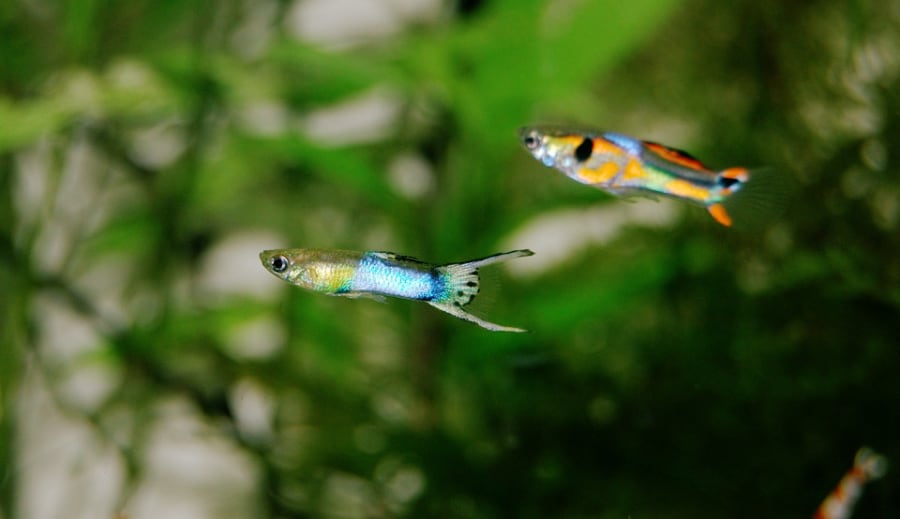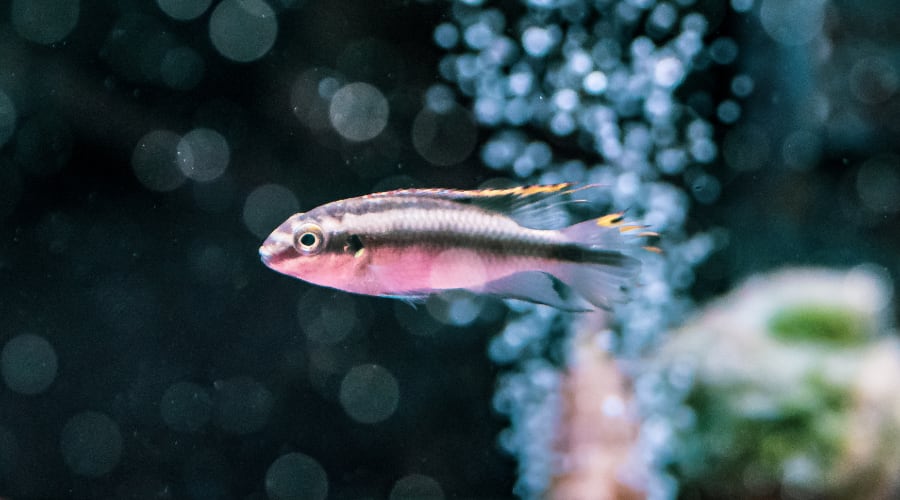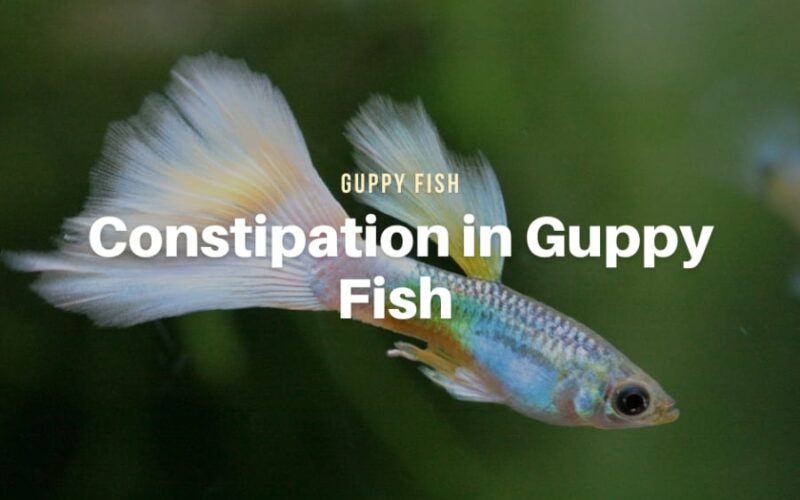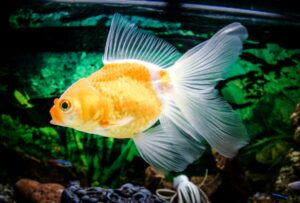Guppy fish is the tropical fish that everyone loves to be their pet. They are easy to care for and they eat everything their owner gives. This behavior sometimes is uncontrollable and the owner tends to overfeed them. As a result, guppy fish constipation is inevitable.
So, what exactly is constipation in guppy fish?
It is the diseases that will lead them to have shorter lifespans. It is dangerous if you let this disease stay in your guppy fish. For this reason, it is important to learn how to cure this fish’s disease, so you can treat them well.
In this article, you will learn how this constipation might happen in this fish. You also will learn the causes, symptoms, and treatment in case your guppy fish experience this disease. Read this article below to find out more about constipated guppy.
Causes of Guppy Fish Constipation
What exactly can cause your guppy have constipation?
1. Improper diet
Dieting for guppy fish such as setting the menu daily is very important. If you keep feeding them monotonous food, it will lead guppy fish to constipation. The quality of the food is also important to pay attention to because they are not picky eaters.
The variety of food is very important. As the owner, you can create a simple schedule to make them live well. For example, feeding the pellets for them every day is bad. You can try some freeze-dried food or live food such as bloodworms to give more nutrition.
Since they are not picky eaters, you have to know which food that guppy fish should avoid to prevent them from getting constipation. Even though the fish can eat bread, don’t give them. Expired food is also disallowed because it leads to this dangerous disease.
2. Overfeeding
Overfeeding is also the reason for constipation in guppy fish. This is the primary cause that you should expect from taking care of this fish. Guppy fish is always hungry. They will eat every time you give them food. It will confuse your schedule of feeding them
The experience of overfeeding is often happening to the guppy fish owner. Since it is very dangerous, you have to give a schedule at least once or twice a day. You should watch the speed of them eating the food. If they eat the food in more than two minutes, then stop feeding them.
What if you overfeed and the food ends up on the surface of the water?
You have to clean the tank. It prevents the guppy fish from eating more food which leads them to have constipation. The quantity should be correct and you can read the guideline to feed them.
3. Food allergy
Constipation in guppy fish may be caused by food allergies. Some foods are good for them, but the rest may not. So, you have to be careful when choosing food. Guppy fish eat a lot of live food and they cannot pick what the owner serves. They eat everything.
Sometimes, the brand for pellets might not be suitable for them as well and lead to constipation. You should be aware of this in case your fish suddenly becomes less active than usual. Change the brand of the food to feed the guppy fish.
4. Less exercise
Another reason why constipation in guppy fish occurs is that the fish has less time to exercise. They might have a small size and it doesn’t give them a chance to swim. Since they are less active and the space is limited, they become lazier than they should be.
In addition, the small size tank which has decoration and additional lively creatures like plants make the guppy fish have a few movements. The space is dominated by other creatures and they choose to stay in one place rather than exercise. Guppy fish constipation has a higher chance to happen.
5. Swim bladder disease
This disease is on another level when it comes to guppy fish. One of the causes is a swim bladder that usually attacks tropical fish. They might suffer constipation when they have swimbladder disease. They usually reject any food that you give them.
Symptoms for Guppy Fish Constipation

Several symptoms and signs to make you more alert just in case your guppy fish is having constipation.
1. They cannot swim
The first thing you might notice is how guppy swim. They have trouble when they swim. Sometimes, the movements look like they are trying to balance their torso. Guppy fish constipation ruins the belly part and it makes it difficult to move around the tank freely as it should.
These symptoms might as well appear when the guppy fish is pregnant. So, you have to check other symptoms as well to make sure of the possibility of constipation. Other symptoms will help you to conclude.
2. Passing stool
The clear indicator that the guppy fish has constipation is when they are not passing stool. You have to check whether they can pass or not. It may need to look at them properly. However, you can notice this problem if they don’t pass the stool for days. It is weird if they don’t.
3. Stringy feces
Another thing you can notice is how they pass the stool. When they are in a stable and healthy state, they will be able to fall out the feces and sink it immediately. However, if you see feces hanging on their body for a long time, it is a sign of a guppy fish has constipation.
4. Lethargy
Lethargy is how they don’t swim properly. It is because their belly is bloated because of constipation. Then, they don’t feel like swimming at all. They might move, but it becomes so passive. This lethargic behavior is the sign why the guppy fish suffers from constipation.
How to check whether the guppy fish has lethargy? You have to see the behavior for at least two hours to make sure about this. If they are less active and tend to rest more, it is a sign of lethargy. They might suffer other diseases, but constipated guppy fish are more likely.
5. Bloated belly
The easiest thing to notice for constipated guppy fish is a bloated belly. You can see this symptom with the naked eye because it is easy to see. It is an indicator that they have constipation. If you see these symptoms in male guppy, it is probably severe constipation.
How to Treat Constipated Guppy Fish
So, how do you treat constipation in guppy fish?
1. Spreading Epsom salt
The first option that you can do is to spread Epsom salt. This salt is helpful to reduce severe constipation in guppy fish. However, this Epsom salt therapy is good in a quarantine tank. You have to move the guppy fish in a special tank for this method.
How much Epsom salt do you have to give to the tank? Per 5 gallons of water, you have to mix about 1/8 teaspoon of Epsom salt. The dose might be different according to the age of the fish and also the brand of the salt.
How to mix the Epsom salt in the tank? You cannot pour the Epsom salt directly into the tank. You have to take some water from the tank, then mix it until the salt is dissolved. After that, you can pour the dissolved water into the big tank. The last step is to put the fish in it.
2. Guppy fish fasting
Even though the guppy fish loves to eat, you can let the fish fast for three days. It sounds so mean to remember that this fish always eats what the owner eats. However, this is a chance to make the constipation get better. They are cold-blooded and no food for days is not bad for their health.
The fasting method is simple because you let the guppy fish digest the food they have in their belly. Constipation may be from the blockage they have in the belly. After three days, usually you will see whether the guppy fish is still constipated or not. They are more likely to get better.
3. Feed with some fiber food
Fiber food is important to maintain their health in general. The best food that contains fiber is peas. They have high fiber and help guppy fish to digest the food better. Fiber also tracts the stool easier if you find out they don’t pass the stool for days. This method is easy and cheap to do.
However, it doesn’t mean that you will put the peas directly into the tank. You have to add the peas to boiling water and let them soak for 30 minutes. The boiling water will soften the peas, so it is easier to digest the guppy fish. Remove the excess to not dirt the tank after that.
4. Changing the water
Water quality may be the biggest reason why guppy fish constipation occurs. You don’t have to change all water in the tank. Only 25% of water is alright. If constipation still occurs, you have to check other possibilities because the water quality is not the cause.
5. Increasing water temperature
If the temperature of the water is too cold, the tank environment should likely increase the temperature. The cold water only leads to constipation because the food in their belly is harder to digest. Heat the tank temperature slowly for a few hours until they get better.
How to Prevent Guppy Fish Constipation

Here are several tips on preventing your guppy from having constipation.
1. Give only the best food
It is important to give the best food to your guppy fish. It is not about the price because sometimes the expensive brand might not be suitable for them. However, you can give the guppy fish the correct food according to what they need.
They also need a variety of food to avoid constipation. The menu should be different and on schedule. You can give them many kinds of healthy food such as flakes, pellets, and live food. The mix of larvae and brine shrimp is the best option your fish can take.
Besides giving them carnivore food and instant food, you can give them some food that contains some fiber. The vegetation in their diet will help to avoid severe symptoms of constipation. Some foods like lettuce, zucchini, and peas are the best choice for them to eat.
2. Temperature setting
Temperature setting is the most important treatment that they should get. Low temperature is the cause guppy fish has constipation because their health becomes more vulnerable. This condition leads them to get severe cases. Setting the temperature is the best option.
The tan environment should be at least in the range of 72-83 Fahrenheit. This temperature is ideal. If you live in non-tropical countries, you can add a heater to heat the water. There are many kinds of aquarium heaters that you can buy online.
3. Adding java moss
Java moss is a vegetable for aquariums that you can add to the tank. Your guppy fish needs some fiber in their diet. In case you only give them some live food and instant food, they will eat the java moss to balance their nutrition. Java moss is safe and easy to grow.
You have to adjust the life of java moss in the aquarium. If you only have one guppy fish in the tank, you have to maintain the growth of java moss. They grow fast and appear often. So, if you give java moss inside the aquarium, make sure that you are ready to cut them once in a while.
4. Check the regular diet
Preventing guppy fish constipation means you have to check their diet. It can be your fault for giving the food. For example, giving blood worms every time for daily food is bad. They only need bloodworms as a treat. Some food is better to give only once in a while.
It is easier for you to create a simple schedule for them. The type of food is the biggest reason for this disease, so you have to make a list of the food that you will give to them in a week. A variety of food is important since this fish is both a carnivore and herbivore.
5. Stop overfeeding
Feeding guppy fish shouldn’t be overfeeding. They eat everything and every time you give them food. Feeding the fish should be properly done with the right schedule. They should eat once or twice daily with a little amount of food to prevent constipation.
Usually, they eat well in the morning. You can give the food based on the schedule with a variety of food. The proper food is when they eat in less than two minutes. If you find excessive food on the surface of the water, you can take it out to avoid overfeeding.
6. Adjusting tank environment
The tank environment should support the life of guppy fish, so they won’t have constipation. The water quality should be clean. It is important to put a water filter in the aquarium, so the quality is better and safe. Clean the filter at least once a week.
The water should be free from debris and excessed food. A water filter is not enough, so it is better if you change the water at least once every two weeks. The water quality is also the reason why constipation occurs in guppy fish.
You might also find out that the tank is too small for your guppy fish. Remember, the water tank should be at least 5 gallons of water for a single guppy fish. If the size of the tank is too small, they tend to be lazy and it leads to constipation.
7. Putting an eco-bio block
Eco-bio block looks like volcanic stone. It is a real and natural stone that is very useful to maintain water quality. The stone can produce some beneficial bacteria. The bacteria can reduce the risk of constipation fast and effectively.
You can buy this stone online and can be multiplied into smaller stones. The stone will sink onto the floor. Besides beneficial bacteria, this stone is producing a nitrogen cycle. This gas is helpful to create a cleaner environment in the tank.
The Risk of Constipation in Guppy Fish
The risk of having constipation in guppy fish is getting more diseases. The level of the illness can be worse. It leads them to be weaker because the immune system has decreased because of constipation. The fish is stressed as well because of the illness.
If the condition is not better over time, the fish will get weaker. They might refuse to eat the food and they become more passive. If this keeps occurring, the risk of death possibly happens a few days later. So, make sure you always track the condition.
Guppy constipation disease is not something you can take it easy. It leads to more dangerous conditions. Severe constipation is the reason why this fish cannot live well anymore. It is important to understand the symptoms and how to treat the fish.
Constipation in guppy can be treated well and they will survive if you pay attention to the details of the symptoms. You have to be patient because this disease can last about a week or more. If you find those symptoms, treat them immediately as the suggestion above.



